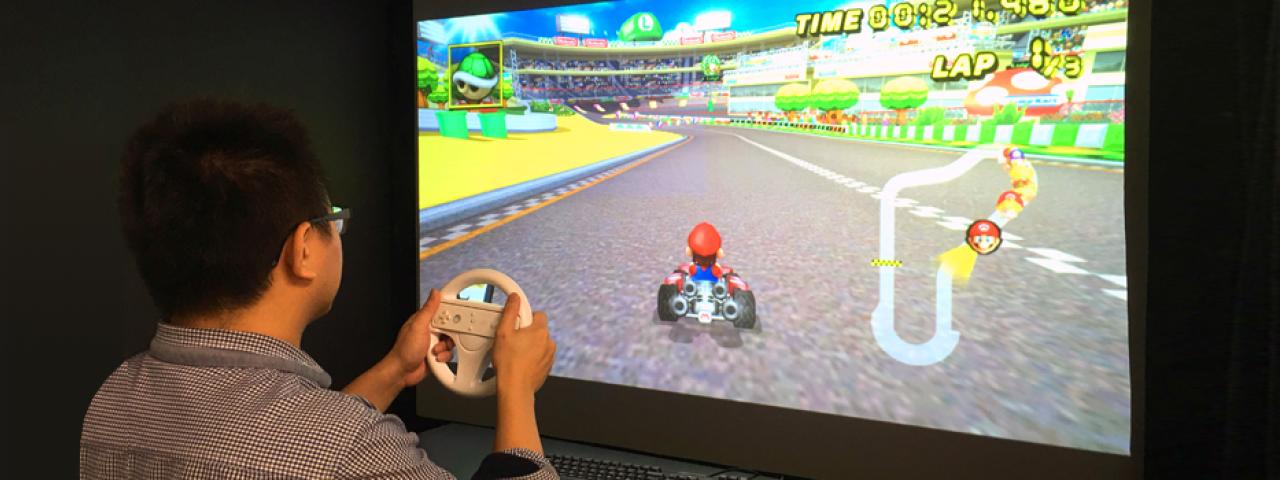
NYU Shanghai Associate Professor of Neuroscience and Psychology Li Li and her students have discovered a silver lining in an activity that many parents approach with caution -- it turns out playing action games such as “Mario Kart” or “Unreal Tournament” can significantly sharpen a person’s visual motor skills critical to driving, and may help brain-damaged patients with visual motor control deficits (e.g., Parkinson's disease patients).
The study was published in Psychological Science early in July. Professor Li, together with her lab members from the University of Hong Kong, have devised a series of experiments to explore the link between playing action-based video games and visual motor control ability.
Q: Where did this research idea - to find connections between playing video games and driving skills - come from?
My lab studies visual motor control in general. Whether action gaming improves visual motor control and whether action video games can be used as training tools for driving have long been standing questions in the field. We started the research work when Rongrong Chen, my PhD student and co-first author of the article, joined my lab. She worked in gaming industry thus it was a perfect research project for her to work on.
Q: What are visual motor control skills and how are they linked to driving quality?
Visual motor control skills reflect our ability to use relevant incoming visual cues and initiate effective motor responses. The better visual motor control skills we have, the more precise forceful control and shorter reaction time we have when driving on the road.
Q: Could you describe briefly the experiment process and how you reached your conclusion?
We first tested action gamers to find out whether they had better driving skills (eg, lane keeping) than non-action gamers. They indeed did. We then developed a task to examine whether action gamers had better visual motor control skills critical to driving without considering other factors (such as locomotion-control strategies) that might affect driving. Again, the answer was yes.
To establish a causal link between action gaming and improvement in visual motor control, we then trained non-action gamers with action or nonaction video games. We found that after they played a driving or first-person-shooter (FPS) video game for as little as 5 hr (eg, 1 hour per day for 5 days in a week), their visual motor control skills improved significantly. In contrast, non-action gamers showed no such improvement after they played a strategic simulation video game, despite the fact that both groups reported that they had similar amount of fun when playing the games.
Lastly, we did mathematical modeling of the data and found that although different types of action video games have different effects on our sensorimotor system in charge of visual motor control, playing action video games in general makes us more sensitive to pick up relevant visual information and generate effective motor control accordingly.

Q: How did the results of your research findings reshape your initial take on video games? Do you think there are more social advantages or disadvantages with playing video games?
I now no longer think that playing action video games is a waste of time and purely for entertainment purposes. Action gaming can improve our essential visual motor skills. Some parents might worry about the violent aspect of action video games such as the first-person-shooter (FPS) games. However, there is no solid research evidence supporting the claim that playing FPS games leads to violence in real life (read this Scientific American article), or any causal relation between violent video games and the perpetuation of violent acts. People are able to tell that the fighting engaged in with video games is more like play than violence in real world.
Q: What insight can we draw from the discovery, for example, adding a video game component in the training for a driver’s licence?
Our research work shows that for experienced drivers, who have stable control but need to improve their ability to predict incoming visual signals based on their current action, training with FPS rather than driving video games is more effective.
In contrast, for novice drivers, who are still struggling with obtaining stable control, training with driving rather than FPS video games is more helpful.
Q: Can the findings be applied to other social circumstances outside of improving driving skills? What is your plan for further research on this topic?
We have recently found that action gamers also have better eye-hand coordination skills than non-action gamers. Their expertise in eye-hand coordination is similar to that of professional athletes who play ball games (such as ping-pong, tennis, badminton, & baseball). This suggests that playing action video games might also help improve eye-hand coordination skills for playing sports.
At the moment, we are using virtual reality techniques to study visual motor control in both healthy people and Parkinson’s Disease patients. Our goal is to help develop effective assessment and training tools to improve the quality of life of brain-damaged patients with visual motor control deficits.


